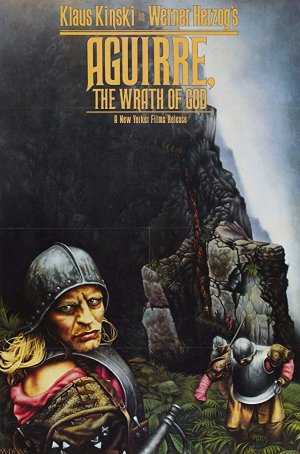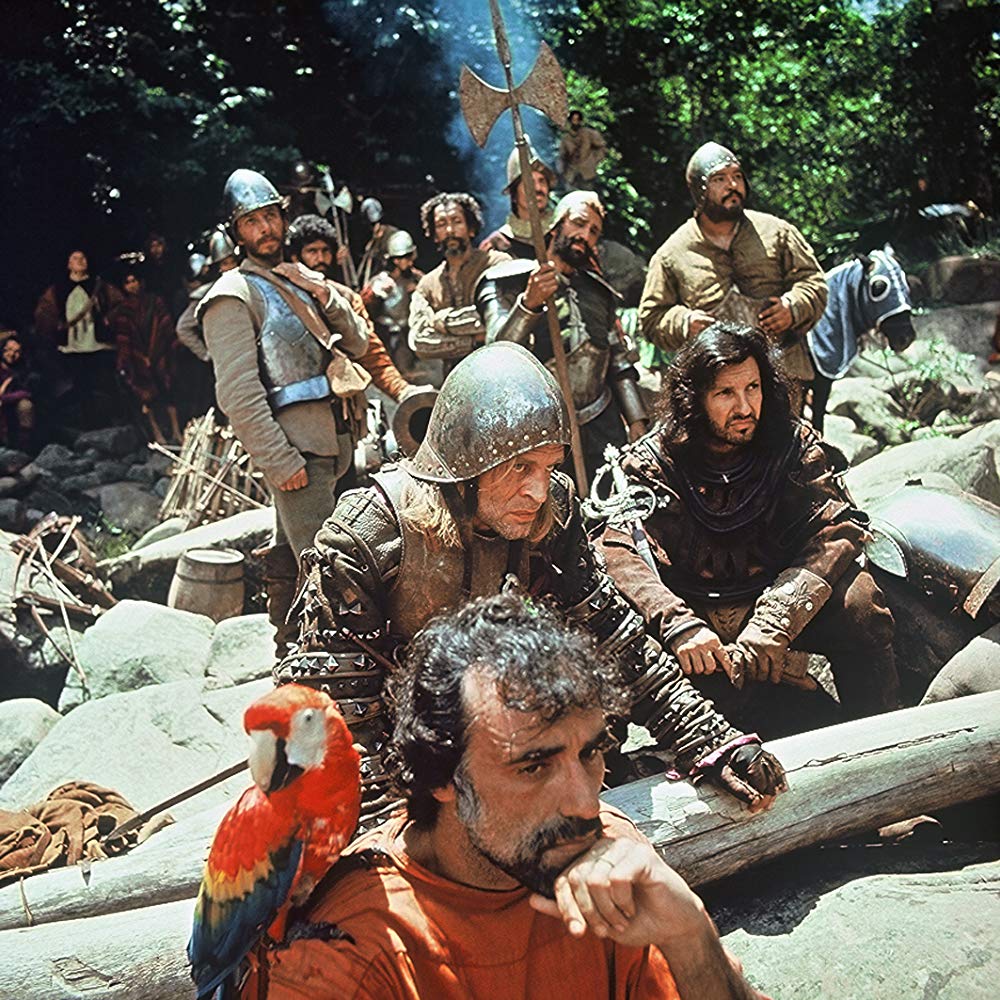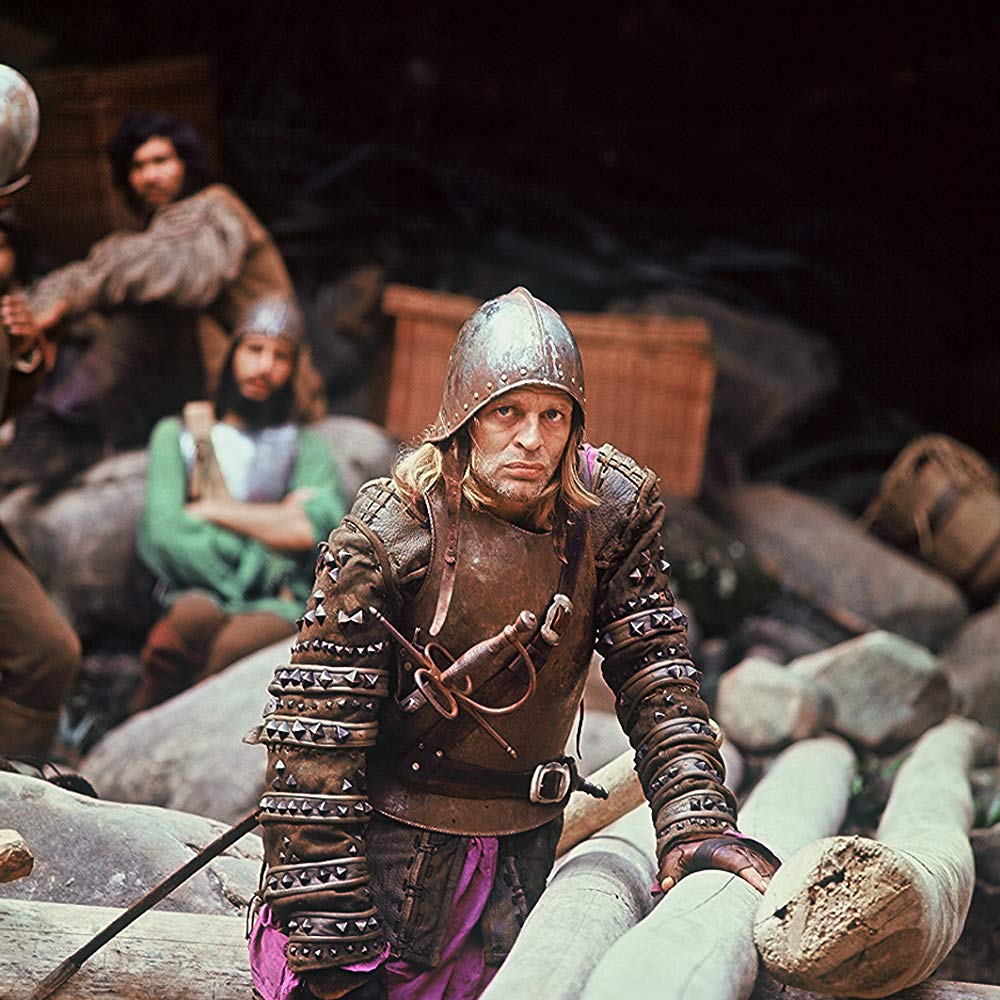Aguirre, The Wrath of God (West Germany, 1972)
September 29, 2018
A ragtag column of men, many dressed in full armor and
others lugging an enclosed sedan chair, wend their way down a treacherous mountainside
path. This is the first image we see in Werner Herzog’s Aguirre, the Wrath of God. He holds it for nearly three minutes,
allowing us to absorb not only the details of the setting but the absurdity of
the endeavor. It has always been the way of the world that although
civilization can obliterate wilderness (and vice versa), the two rarely
co-exist. For a cultured, city-bred person to venture into as untamed a place
as the Peruvian Amazon, there are only two possibilities: madness and death,
and those aren’t mutually exclusive.
Like Francis Ford Coppola’s Apocalypse Now, which was made several years after Herzog’s film
and cites it as an inspiration, Aguirre
is about what happens when men venture into the heart of the jungle and face
threats they are unprepared to counter. Although Aguirre is largely fictional, Herzog drew on a couple of historical
expeditions from the late 1500s – quests to expand Spain’s New World influence
and locate the legendary city of El Dorado – for inspiration. He chose to film
on location – a decision that caused hardships for the cast and crew but resulted
in an undeniable verisimilitude. The movie offers a powerful sense of being
stranded and untethered. We realize in the early-going that this isn’t about people
surviving; it’s about people failing
to survive.
It’s 1560 and a large contingent of Spanish conquistadors
and their Indian slaves has ventured east of the Andes in search of fabled
riches. Their commander, Gonzalo Pizzaro (Alejandro Repulles), eventually
recognizes that continuing forward – a slow process that requires cannons to be
pulled through deep mud with diseased men dying along the way – is foolish.
With supplies running out, Pizzaro orders 40 souls to scout ahead. They have
one week – if they haven’t returned by then, they will be declared “lost” and
the expedition will return the way it came.
The advance party is led by Don Pedro de Ursua (Ruy Ruerra),
a level-headed soldier. The second-in-command, Don Lope de Aguirre (Klaus Kinski),
is unhinged – something that becomes apparent early in the proceedings. Also
among the group of 40 are Don Fernando de Guzman (Peter Berling), a nobleman
representing The Royal House of Spain; Brother Gaspar de Carvajal (Del Negro),
a monk who seeks to bring the Word of God to the heathens; and two women – Ursua’s
cultured mistress, Inez (Helena Rojo), and Aguirre’s teenage daughter, Flores
(Cecilia Rivera).
 The journey takes the group downriver and into dangerous
rapids. One of the rafts becomes trapped in an eddy. The rest of the men make camp
but the next morning, all the men on the raft are dead. As Ursua ponders abandoning
the mission, Aguirre mutinies, shooting Usrua and putting Guzman in charge as a
figurehead. Aguirre, whose mind is already gone, rants about conquest and
riches and orders the men to build a massive new raft to transport the
remainder of the expedition down the Amazon into dangerous and unknown
territories where Indians shoot from cover on the banks and cannibals leave behind
abandoned settlements. Ursua is tried and found guilty but Guzman (to Aguirre’s
surprise and consternation) pardons him. That small kink in the plans, however,
does nothing to dim the madman’s determination to achieve glory.
The journey takes the group downriver and into dangerous
rapids. One of the rafts becomes trapped in an eddy. The rest of the men make camp
but the next morning, all the men on the raft are dead. As Ursua ponders abandoning
the mission, Aguirre mutinies, shooting Usrua and putting Guzman in charge as a
figurehead. Aguirre, whose mind is already gone, rants about conquest and
riches and orders the men to build a massive new raft to transport the
remainder of the expedition down the Amazon into dangerous and unknown
territories where Indians shoot from cover on the banks and cannibals leave behind
abandoned settlements. Ursua is tried and found guilty but Guzman (to Aguirre’s
surprise and consternation) pardons him. That small kink in the plans, however,
does nothing to dim the madman’s determination to achieve glory.
The movie doesn’t have much of story and there isn’t a lot
of dialogue. Aguirre is about moods,
moments, and images. It’s about developing a tone of isolation and peril and
stranding both the characters and the audience in that place. Most of all, it’s
about the performance of Klaus Kinski, whose chilling interpretation of Aguirre
is quietly menacing and entirely too believable. Stories abound about the clashes
between Herzog and Kinski deep in the South American jungle. One alleges that the
director brandished a weapon and threatened to shoot Kinski if he walked off
the set. Whatever the case, the toxic chemistry between the two was potent
enough to keep them together – they made four more films with each other after
this, their first collaboration.
 The soundtrack is a cobbled-together affair with the
haunting sounds of progressive band Popol Vuh blending seamlessly with the
jungle and river’s ambient noise. All of the dialogue was recorded in English –
a necessity because it was the only language understood by everyone. Although
Herzog originally planned to release the film in English, it proved difficult
so a high-quality German dub was created for theatrical distribution. (Because Kinski
demanded an outrageous sum to re-record his lines, Aguirre is voiced by another
actor.) On DVD, however, the original English track is available and is the preferred
way to watch the film (in part to hear Kinski’s voice).
The soundtrack is a cobbled-together affair with the
haunting sounds of progressive band Popol Vuh blending seamlessly with the
jungle and river’s ambient noise. All of the dialogue was recorded in English –
a necessity because it was the only language understood by everyone. Although
Herzog originally planned to release the film in English, it proved difficult
so a high-quality German dub was created for theatrical distribution. (Because Kinski
demanded an outrageous sum to re-record his lines, Aguirre is voiced by another
actor.) On DVD, however, the original English track is available and is the preferred
way to watch the film (in part to hear Kinski’s voice).
Aguirre’s reputation has grown over the years in parallel with Herzog’s greater recognition as one of his generation’s most accomplished filmmakers. It’s a slow, hypnotic movie that requires a certain level of patience from the viewer and an expectation that not a lot is going to happen. Many have cited similarities between this movie and Terrence Malick’s 2005 feature The New World. Indeed, the films are similar in the way they prioritize style and ambiance over narrative and character. Aguirre is a compelling piece of historical fiction that lingers in the memory largely because of its lush, claustrophobic atmosphere and the towering presence of Kinski.
Aguirre, The Wrath of God (West Germany, 1972)
Cast: Klaus Kinski, Helena Rojo, Del Negro, Ruy Guerra, Peter Berling, Cecilia Rivera
Home Release Date: 2018-09-29
Screenplay: Werner Herzog
Cinematography: Thomas Mauch
Music: Popol Vuh
U.S. Distributor: New Yorker Films
U.S. Release Date: 1977-04-03
MPAA Rating: "NR" (Violence)
Genre: Drama/Adventure
Subtitles: none
Theatrical Aspect Ratio: 1.33:1
- Nosferatu the Vampyre (1969)
- (There are no more better movies of Klaus Kinski)
- (There are no more worst movies of Klaus Kinski)
- (There are no more better movies of Helena Rojo)
- (There are no more worst movies of Helena Rojo)
- (There are no more better movies of Del Negro)
- (There are no more worst movies of Del Negro)

Comments